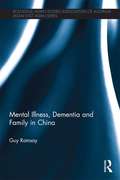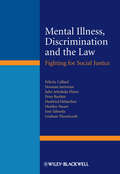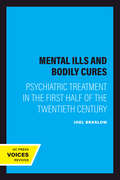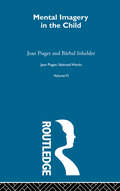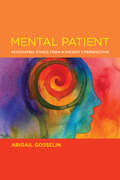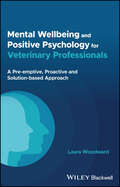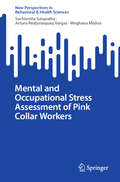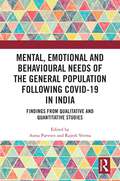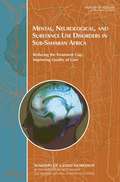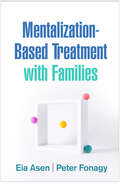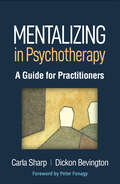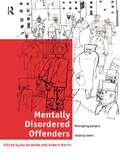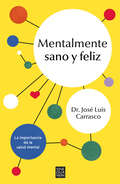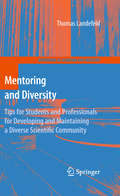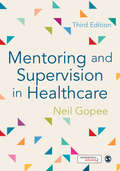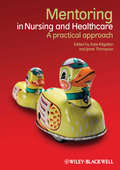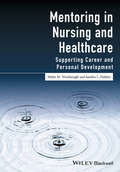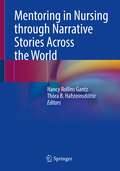- Table View
- List View
Mental Illness, Dementia and Family in China (Routledge/Asian Studies Association of Australia (ASAA) East Asian Series)
by Guy RamsayWith rapid economic progress and increasing life expectancy in East Asian societies, more attention is being paid by their governments, the media and the academy to mental illness and dementia. While clinical research on mental illness and dementia in Chinese societies acknowledges the importance of culture in shaping people’s experiences of these illnesses, how Chinese culture shapes people’s understandings of and responses to mental illness and dementia has yet to be interrogated to any depth. Mental Illness, Dementia and Family in China breaks new ground in exploring how Chinese culture, namely, the understandings, norms, values and scripts that people acquire through being members of a Chinese community, shapes contemporary stories of mental illness, dementia and family care-giving. This book is innovative in examining and comparing stories which have been drawn from both real life (‘life stories’), as well as from film and television productions (‘filmic stories’). These two forms effectively complement each other, with life stories generally presenting an ‘insider’s’ account and filmic stories generally presenting an ‘outsider’s’ account. What remains unvoiced in one kind of story may be voiced in the other kind. Drawing on the perspectives and analytic approaches of narrative analysis and cultural studies, Guy Ramsay uncovers culturally-shaped continuities and departures in representations of time, identity and cause of illness as well as in the language employed in contemporary stories of mental illness, dementia and family care-giving in China. This book will be invaluable to students and scholars working on Chinese cultural studies and Asian social policy, as well as those interested in psychiatry, mental health and disability studies more broadly.
Mental Illness, Discrimination and the Law
by Norman Sartorius Graham Thornicroft Julio Arboleda-Flórez Peter Bartlett Heather Stuart José Taborda Felicity Callard Hanfried HelmchenThis book describes clearly how legislation can be used to advance the rights and entitlements of people with mental health problems. Straightforward and practical, it provides useful information on how to address disabilities so these people may enjoy full citizenship. It presents the key issues succinctly and illustrates these with legislative examples from around the world. This book documents the role that law can play, at all levels, in combating such discrimination and abuse.
Mental Ills and Bodily Cures: Psychiatric Treatment in the First Half of the Twentieth Century (Medicine and Society #8)
by Joel BraslowMental Ills and Bodily Cures depicts a time when psychiatric medicine went to lengths we now find extreme and perhaps even brutal ways to heal the mind by treating the body. From a treasure trove of California psychiatric hospital records, including many verbatim transcripts of patient interviews, Joel Braslow masterfully reconstructs the world of mental patients and their doctors in the first half of the twentieth century. Hydrotherapy, sterilization, electroshock, lobotomy, and clitoridectomy—these were among the drastic somatic treatments used in these hospitals.By allowing the would-be healers and those in psychological and physical distress to speak for themselves, Braslow captures the intense and emotional interplay surrounding these therapies. His investigation combines revealing clinical detail with the immediacy of "being there" in the institutional setting while decisions are made, procedures undertaken, and results observed by all those involved. We learn how well-intentioned physicians could rationalize and regard as therapeutic treatments that often had dreadful consequences, and how much the social and cultural world is inscribed within the practice of biological psychiatry. The book will interest historians of medicine, practicing psychiatrists, and everyone who knows or has seen what it's like to be in mental distress.
Mental Imaginery in the Child: Selected Works vol 6
by Jean PiagetFirst published in 1997. Volume 6 in the series titled Jean Piaget: Selected Works. The authors of this title, having studied all aspects of the development of intellectual operations, and having attempted to analyse some of the characteristics of perceptual development, felt it was necessary to tackle the question of the evolution of mental images. These ten chapters provide digestible commentary and discussion on the classification, reproduction, and transformation of mental images - with focus on kinetic images, anticipatory images and the spatial image.
Mental Patient: Psychiatric Ethics from a Patient’s Perspective (Basic Bioethics)
by Abigail GosselinA philosopher who has experienced psychosis argues that recovery requires regaining agency and autonomy within a therapeutic relationship based on mutual trust.In Mental Patient, philosopher Abigail Gosselin uses her personal experiences with psychosis and the process of recovery to explore often overlooked psychiatric ethics. For many people who struggle with psychosis, she argues, psychosis impairs agency and autonomy. She shows how clinicians can help psychiatric patients regain agency and autonomy through a positive therapeutic relationship characterized by mutual trust. Patients, she says, need to take an active role in regaining their agency and autonomy—specifically, by giving testimony, constructing a narrative of their experience to instill meaning, making choices about treatment, and deciding to show up and participate in life activities. Gosselin examines how psychotic experience is medicalized and describes what it is like to be a patient receiving mental health care treatment. In addition to mutual trust, she says, a productive therapeutic relationship requires the clinician&’s empathetic understanding of the patient&’s experiences and perspective. She also explains why psychotic patients sometimes feel ambivalent about recovery and struggle to stay committed to it. The psychiatric ethics issues she examines include the development of epistemic agency and credibility, epistemic justice, the use of coercion, therapeutic alliance, the significance of choice, and the taking of responsibility. Mental Patient differs from straightforward memoirs of psychiatric illness in that it analyses philosophic issues related to psychosis and recovery, and it differs from other books on psychiatric ethics in that its analyses are drawn from the author&’s first-person experiences as a mental patient.
Mental Traveler: A Father, a Son, and a Journey through Schizophrenia
by W. J. MitchellHow does a parent make sense of a child’s severe mental illness? How does a father meet the daily challenges of caring for his gifted but delusional son, while seeking to overcome the stigma of madness and the limits of psychiatry? W. J. T. Mitchell’s memoir tells the story—at once representative and unique—of one family’s encounter with mental illness and bears witness to the life of the talented young man who was his son. Gabriel Mitchell was diagnosed with schizophrenia at age twenty-one and died by suicide eighteen years later. He left behind a remarkable archive of creative work and a father determined to honor his son’s attempts to conquer his own illness. Before his death, Gabe had been working on a film that would show madness from inside and out, as media stereotype and spectacle, symptom and stigma, malady and minority status, disability and gateway to insight. He was convinced that madness is an extreme form of subjective experience that we all endure at some point in our lives, whether in moments of ecstasy or melancholy, or in the enduring trauma of a broken heart. Gabe’s declared ambition was to transform schizophrenia from a death sentence to a learning experience, and madness from a curse to a critical perspective. Shot through with love and pain, Mental Traveler shows how Gabe drew his father into his quest for enlightenment within madness. It is a book that will touch anyone struggling to cope with mental illness, and especially for parents and caregivers of those caught in its grasp.
Mental Wellbeing and Positive Psychology for Veterinary Professionals: A Pre-emptive, Proactive and Solution-based Approach
by Laura WoodwardMental Wellbeing and Positive Psychology for Veterinary Professionals Explore practical strategies for mental wellbeing across the veterinary professions Mental Wellbeing and Positive Psychology for Veterinary Professionals: A Pre-emptive, Proactive and Solution-based Approach delivers a practical, hands-on guide to mental health and resilience for individual members of the veterinary professions and for those managing entire practices. Divided into 6 sections, the text offers valuable tools, including meditation, mindfulness, and positive psychology, to help readers grapple with the mental challenges presented by veterinary practice. The author has also included a series of case studies and anecdotes from her experience in counselling members of the professions, including a new-graduate vet, a specialist surgeon, and a head nurse, as they encounter issues like anxiety, compassion fatigue, fear of failure, imposter syndrome, and grief. By learning in advance about the common hurdles they will face during their careers, the reader will discover how to prepare for these in positive and proactive ways. Readers will also find: A thorough introduction to effective strategies for dealing with the difficulties of the veterinary professions, including mindfulness, empathy, and emotional intelligence Comprehensive explorations of meditation, including body scan meditation, breath meditation, imagery, and mini-meditations Practical discussions of specific challenges faced by veterinary practitioners, including moral injury, client complaints, burnout, imposter syndrome, and a loss of confidence Fulsome case studies, including a veterinary nurse’s journey to mental wellbeing Dr. Laura Woodward is well positioned to write on the topic, as both a working veterinary surgeon and an accredited counsellor and has crafted a text that is perfect for veterinarians, veterinary nurses, and practice managers. Mental Wellbeing and Positive Psychology for Veterinary Professionals will also benefit veterinary students, student veterinary nurses, and teaching staff seeking a comprehensive resource for veterinary mental health.
Mental and Occupational Stress Assessment of Pink Collar Workers (New Perspectives in Behavioral & Health Sciences)
by Arturo Realyvásquez Vargas Suchismita Satapathy Meghana MishraThis book delves into the mental and occupational stress of pink-collar workers. A pink-collar worker is a person employed in a care-related profession or in an area that has traditionally been seen as the domain of women. Examples include jobs in the beauty business, nursing, social work, education, teaching, secretarial work, upholstery, or child care. To help with the financial burdens of their family, pink-collar workers engage in their job for at least 8 to 10 hours a day, which often leads to sacrificing their time with their family. Additionally, pink-collar works face many barriers like emotional labor (e.g., dealing with patients or clients), workload, interpersonal conflicts, and job insecurity. This book endeavors to study the physical stressors and mental stress of pink-collar workers so that new policies can be framed or suggested for the wellness of pink-collar workers.
Mental, Emotional and Behavioural Needs of the General Population Following COVID-19 in India: Findings from Qualitative and Quantitative Studies
by Rajesh Verma Asma ParveenMental, Emotional and Behavioural Needs of the General Population Following COVID-19 in India: Findings from Qualitative and Quantitative Studies explores the psychological challenges arising from COVID-19 that impacted the Indian general population. The book contains comprehensive research, conducted during and post-pandemic, on economic, social, psychological and health factors in the context of recovery, handling, coping and resilience. It also offers practical approaches for reproducing results and outcomes. These studies unmask several challenges, coping mechanisms and interventions adopted by the general population.The book covers a wide range of mental health domains, including offering insight into the impact of COVID-19 on the mental health status of those who have sustained the atrocities of cross-border terrorism and mass migration for more than three decades, and can still find meaning in life.The book navigates the complexities of risk factors and digital mental health interventions along with understanding the experiences of the general population through the lens of cultural narrative. It explores the social stigma, transitional impact and ruminative experiences of people who passed through the psychological grinding times and paves the way for effective interventions and resilience-building strategies in the post-pandemic era.It is a valuable reading for researchers, mental health practitioners, policymakers and educators to learn about the most recent developments, concerns, real-world difficulties encountered and solutions taken in the mental health field following COVID-19, as well as offering implementable methods for replication.
Mental, Emotional, and Behavioural Health Needs of Specific Populations following COVID-19 in India: Findings from Qualitative and Quantitative Studies
by Rajesh VermaThe book Mental, Emotional, and Behavioural Needs of Specific Populations following COVID-19 in India: Findings from Qualitative and Quantitative Studies reviews quantitative and qualitative research, conducted during and post-pandemic, on economic, social, psychological, and health factors across diverse, specific populations in India. It studies numerous psychological elements of COVID-19 in the context of recovery, handling, coping, and resilience and offers practical approaches for reproducing results and outcomes.The book includes predictors of mental well-being across women survivors, students, migrant women, and neurodivergent populations. Chapters focus on a wide range of themes including the mental health of Border Security Force personnel during COVID-19 and issues of women’s violence and mental health problems amongst poor and migrant workers after COVID-19. The book also throws light on sensitive and beneficial topics such as experiences of a mother of an autistic child and the strengthening of LGBTQIA+ mental health through personal growth initiatives.It is valuable reading for researchers, mental health practitioners, policymakers, and educators to learn about the most recent developments, concerns, and real-world difficulties encountered, and solutions taken in the mental health field following COVID-19, as well as offering implementable methods for replication.
Mental, Neurological, and Substance Use Disorders in Sub-Saharan Africa: Reducing the Treatment Gap, Improving Quality of Care - Summary of a Joint Workshop
by Institute of Medicine of the National AcademiesMillions of people in sub-Saharan Africa suffer from mental, neurological, and substance use (MNS) disorders, and most do not have the resources to obtain treatment. The Uganda National Academy of Sciences and the Institute of Medicine hosted a workshop to discuss the state of care for MNS disorders in sub-Saharan Africa.
Mentale training in de sport: Toepassing en effecten
by Rico SchuijersDe belangen in de topsport zijn in de afgelopen decennia flink toegenomen. Daarmee is ook de mentale druk als prestatiebepalende factor een grotere rol gaan spelen. Zelfvertrouwen blijkt doorslaggevend op het moment dat het er echt om spant. Dit boek leert (top)sporters alles over mentale-trainingsprogramma's en bewijst dat het gebruik ervan zijn vruchten afwerpt.Zelfvertrouwen trainen? Aan de hand van wetenschappelijk onderzoek gedaan met topsporters van wereldniveau bewijst dit boek dat sporters beter presteren wanneer ze hun mentale vaardigheden trainen. Mentale training verbetert de technische uitvoering, waardoor (top)sporters hun hoogst haalbare persoonlijke niveau halen en uiteindelijk vaker zullen winnen.Praktijkoefeningen Mentale training in de sport is zeker niet alleen theoretisch van aard, maar is evenzeer verrijkend waar het gaat om ademhalings-, ontspannings- en energieoefeningen. Hoe verbeter ik mijn zelfvertrouwen? Hoe bereik ik het juiste spanningsniveau in een wedstrijd? Welke processen zijn van invloed op mijn prestatie?Kortom Mentale training in de sport gaat over falende sporters, verdwenen automatismen, persoonlijkheid, het ongrijpbare fenomeen dat topvorm heet, black-outs, overtraining en ga zo maar door. Het geeft praktijkgerichte aanbevelingen, gefundeerd op gedegen wetenschappelijk onderzoek. Interessante informatie voor iedere sportbeoefenaar die zijn sport serieus neemt, alsmede voor iedereen die actief betrokken is bij de sport. Dit boek is de mentale oppepper tot in lengte van dagen.
Mentalization-Based Treatment with Families
by Peter Fonagy Eia AsenExamining clinical practice with families through a mentalizing lens, this innovative book is filled with practical therapeutic strategies and in-depth case illustrations. The expert authors focus on ways to help parents, children, and adolescents to overcome blocks in how they relate to one another by gaining a deeper understanding of--and openness to--each other's experiences and points of view. The volume draws on the empirically supported mentalization-based treatment (MBT) model and interweaves it with systemic concepts and interventions. It includes guidance for setting up sessions and engaging clients; addressing emotional and behavioral difficulties that frequently lead families to seek treatment; and implementing playful activities, exercises, and games that equip family members to change problematic relationship patterns.
Mentalizing Power and Powerlessness: Constructive and Destructive Use of Power in Psychotherapy
by Marie-Luise AlthoffIn this book, the author discusses with a view to psychotherapeutic practice how power and the exercise of power can be used in a constructive sense. Spontaneously, people tend to associate the topic of power negatively. They mostly talk about their own powerlessness and the power of "those up there", and very rarely about their own striving for power. It is undisputed that power and the exercise of power, as well as dealing with powerlessness, play an important role in psychotherapy. Nevertheless, the constructive and destructive aspects of power are still too little reflected. Here, there is a mentalization deficit on the part of both psychotherapists and patients. In this book questions are asked and suggestions for practice are developed. Written for psychological psychotherapists, child and adolescent psychotherapists, family therapists, counselors, psychiatrists, physicians, students, and psychotherapists in training.
Mentalizing in Psychotherapy: A Guide for Practitioners (Psychoanalysis and Psychological Science)
by Dickon Bevington Carla SharpHow can therapists help clients reflect more deeply on their own--and other people's--thoughts and emotions? How can the therapeutic relationship be leveraged effectively to create change? This concise book guides therapists of any orientation to incorporate innovative mentalization-based strategies into assessment and intervention. Complex ideas are clearly explained and illustrated with extensive session transcripts and vignettes. Ways to help clients struggling with dysregulated emotions and behavior are highlighted. Compelling topics include the role of mentalization difficulties in personality disorders, special concerns in working with adolescents, and how clinicians can improve their own mentalizing capacities.
Mentally Disordered Offenders: Managing People Nobody Owns
by Robert Harris David WebbManaging the Mentally Disordered Offender presses the case for better health care of mentally disturbed law breakers, and the need to divert them from unnecessary imprisonment.Mentally disordered offenders present particular problems in our society, which wants both to sympathise and to punish. How do we get the balance right between sympathy towards their illness and genuine worries about their offending behaviour? What do we do for - and about - people wo have been released from prison yet we suspect continue to pose risks to the safety of others?With specialist contributors from criminology, criminal justice, social work, probation practice and the law, Managing the Mentally Disordered Offender stresses the importance of professional cooperation in community-based services, whilst acknowledgin the psychologically demanding nature of working with mentally disordered people, and ther very real challenges of attempting to contain their wrongdoing without recourse to the repressiveness of imprisonment.
Mentalmente sano y feliz: Mitos y realidades de la salud mental
by José Luis Carrasco Perera¿Qué es la salud mental y de qué manera está ligada a la felicidad? Una de cada cuatro personas sufrirá un trastorno mental a lo largo de su vida. La Organización Mundial de la Salud define la salud mental como un «estado de bienestar psíquico que permite a las personas hacer frente a los momentos de estrés de la vida, desarrollar todas sus habilidades, poder aprender y trabajar adecuadamente y contribuir a la mejora de su comunidad»En este libro, el doctor José Luis Carrasco -referente fundamental de la psiquiatría contemporánea- nos acerca, con un estilo divulgativo, a una de las grandes preocupaciones de la sociedad contemporánea: los trastornos psiquiátricos. El autor aporta, en un lenguaje sencillo, luz y claridad sobre los criterios de salud mental y felicidad, de las emociones, los pensamientos y de las relaciones personales desde el punto de vista médico, social e individual. «La salud mental no se alcanza siguiendo modas ideológicas, es más bien el fruto de unos fenómenos naturales que reducen el malestar y ayudan a tolerar el estrés, estimulando las habilidades mentales y relacionales. La salud mental está ligada a un bienestar más interno que externo y los consejos y las reflexiones contenidas en este libro pueden ayudar a conseguirla».
Mentored by a Madman: The William Burroughs Experiment
by A. J. Lees James GrauerholzA fascinating account by one of the world's leading neurologists of the profound influence of William Burroughs on his medical career. Lees relates how Burroughs, author of Naked Lunch and troubled drug addict, inspired him to discover a ground-breaking treatment for Parkinson's Disease. Lees journeys to the Amazonian rainforest in search of cures, and through self-experimentation seeks to find the answers his patients crave. He enters a powerful plea for the return of imagination to medical research.
Mentoring Nursing and Healthcare Students
by David Kinnell Philip Hughes"This key text offers mentors and students an insight into the relationship between mentorship theory, policy and practice." - Diane Tofts, Kings College London What does effective mentoring mean in actual practice? How can I be a good mentor? This book answers these questions and is designed to offer nursing and healthcare students a foundation in effective mentoring. Chapters examine the roles and responsibilities of the mentor, and how they enhance the process of mentorship. By examining the relevant competencies and knowledge base, the book provides an essential framework for developing the practice skills needed for successful mentoring. Key features include: - Embedded in real-life practice and case study examples - Offers tips for successful mentoring and reflects upon likely challenges - Features a range of interactive study activities linked to the student and mentor′s experiences - Presents the most up-to-date professional guidance - Includes running themes of reflective practice; evidence-based practice and multi-professional working. Mentoring Nursing & Healthcare Students will help both the mentor and the student to develop the skills needed for effective collaboration. It is the core text for mentor preparation and mentor update courses in nursing, midwifery and allied health.
Mentoring and Diversity
by Thomas LandefeldThis book will provide basic guidelines for facilitating the educational advancement of under represented students in the sciences, not only from the student perspective but also from the perspective of faculty advisors/mentors. Although the proper mentoring and advising of students about careers and preparation for the education and training associated with them is one of the most important components of a student's education process, this aspect has been severely lacking in academia in the past as well as the present. This is particularly the case with under represented ethnic minorities, despite the fact that mentoring of minority students has been identified as probably the most effective means for assisting them in achieving success. There are a multitude of reasons for this deficiency, including not enough mentors, students not "reaching out", lack of resources as well as other societal and academic limitations. This book provides tips to help guide a student on choosing mentors, what to expect from mentoring, and effectively developing a strong personal portfolio. Tips are also provided to scientists and faculty on being an effective mentor. The emphasis of the book will be primarily on students of color in the sciences, who are severely under represented, and will be presented in a "guidebook" format to simplify the process as much as possible.
Mentoring and Supervision in Healthcare
by Neil GopeeGopee (health and life sciences, Coventry U. , UK), who has worked in adult and mental health nursing, explores the standards, competencies, and outcomes for effective mentoring in nursing, midwifery, and other healthcare professions based on the UK's Nursing and Midwifery Council Standards to Support Learning and Assessment in Practice. He focuses on eight domain areas identified in the document and the outcomes for mentors, as he compares their role to others (such as clinical supervisors or practice education facilitators) and discusses key factors, personal and professional attributes, and the effects of poor mentoring. He describes how learning occurs and is facilitated; effective learning environments; activities such as evidence-based practice, research implementation, practice development, and management of change; assessing students' clinical competence; leadership; and the evaluation of mentoring. Annotation ©2012 Book News, Inc. , Portland, OR (booknews. com)
Mentoring and Supervision in Healthcare
by Neil GopeeThe Third Edition of this bestselling text continues to combine discussion of the theory and research which defines mentoring in healthcare with a sharp focus on how to do mentoring in practice. Key features of the Third Edition are: · discussion of the latest policy including the Francis Report and 6 Cs of nursing · a companion website with teaching resources for lecturers and expanded case studiesand free SAGE journal articles for students · activities which challenge readers to question their knowledge · example tools for mentors to use in practice, such as learning contracts, lesson plans and professional development plans. The book has been updated with the latest evidence and includes expanded discussions on coaching, working with underachieving students and supporting students with disabilities and special educational needs. Interprofessional in scope, it is essential reading for all those taking mentoring courses in nursing, midwifery, social care and the allied health professions.
Mentoring in Nursing and Healthcare: A Practical Approach
by Janet Thompson Kate KilgallonMentoring in Nursing and Healthcare is a practical, interactive resource that promotes active participation and enhances a deeper level of understanding of mentorship. It explores what is meant by the process of mentoring, addresses what a mentor is, what the role entails, and gives practical help on teaching and assessing students in clinical practice. Written primarily for mentors, this book offers a range of theoretical and practical activities and resources that are enhanced by online learning resources. Each chapter focuses on a different aspect of mentorship, including: The role of mentorship The mentor-student relationship The mentor as teacher Experiential learning and reflective practice Learning styles and teaching theories The mentor as assessor Competence and capability Health improvement Career development A core text for mentor preparation and mentor update courses in nursing and allied health, Mentoring in Nursing and Healthcare is an essential guide that supports learning and ongoing professional development. Key Features: Includes not only the latest and most up-to-date NMC standards, but also the Health and Care Professions Council's standards of proficiency Accessible and practice-oriented, with case studies, reflective exercises and activities throughout Has a strong focus on assessment skills Supported by interactive online resources that include test-yourself questions, multiple choice questions, web-links, PowerPoint slides, case studies, and activities at www.wiley.com/go/mentoring
Mentoring in Nursing and Healthcare: Supporting Career and Personal Development
by Helen M. Woolnough Sandra L. FieldenMentoring in Nursing and Healthcare: Supporting career and personal development is an innovative look into mentoring within nursing, and its implications for career success. It provides an up-to-date review of the current research and literature within mentoring in nursing and healthcare, drawing together the distinctive challenges facing nurses and their career development. It proposes new directions and practical ways forward for the future development of formal mentoring programmes in nursing. Offering fresh insight into mentoring principles and how these can be used beyond pre-registration nurse education to support personal career development. This is an essential book for all those commencing, continuing or returning to a nursing career. Key features: Addresses mentoring as a career development tool Focuses on the individual benefits of being a mentee and mentor and how this can aid professional development Both theoretical and practical material is presented Features case studies throughout book Supports nurses to develop their careers It is sector specific but has transferability across disciplines A summary chapter draws together common threads or theoretical perspectives. The book concludes with strategies for future research and progress
Mentoring in Nursing through Narrative Stories Across the World
by Thóra B. Hafsteinsdóttir Nancy Rollins GantzThe book explores how mentoring, theoretical background of mentoring and how mentoring is used by nurses in all arenas where they work in health care, education, research, policy, politics, and academia in supporting nurses with their professional and career development. Over 300 mentors and mentees, from a wide range of countries across all continents, share their stories of mentoring reflecting on their development in leadership, clinical practice, education, research and politics. The book describes various types of mentoring including more traditional types of mentoring as well as virtual, online and peer mentoring. During the mentorship trajectories the nurses address an inclusive collection of issues that they are faced with and share supporting strategies. The book highlights the importance of mentoring for nurses to support their personal, and professional leadership development. Also, it emphasizes the importance of mentoring for when nurses engaged in variety of projects that could entail or encompass evidence-based clinical practice, development within education, research in the clinical arena, policy formation, political affairs, or cultural inclusion that present significant impact in patient care and healthcare outcomes within and across countries. With The Future of Nursing 2020-2030: Charting a Path to Achieve Health Equity report from the National Academies of Sciences, published in 2021, the role of nursing will become ever more dynamic and therefore the profession of nursing must be visible in improving and securing the future for patients, families, and communities across the globe. Mentoring practices to build the profession’s leaders are forever essential, acute, and imperative.This book shows how mentoring can support nurses in further developing nursing as a profession and scientific discipline across countries to support clinical application of evidence based practice, and nursing education and research dissemination. Accordingly, this book shares essential, diverse and pioneering expertise through wide range of narrative stories that will benefit nurses at all years of experience, from early career nurses, emerging leaders, nurse educators, leaders, policy makers and nurse scientists around the globe. The nursing profession must magnify its position in health care and nurses need to proliferate their contributions throughout the globe. They can accomplish that through mentoring and “growing and nurturing other nurses” to advance and thrive in today’s world.
